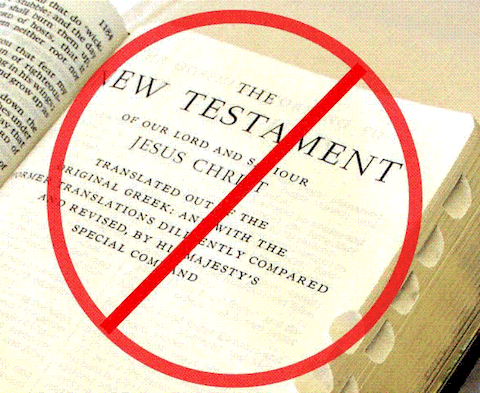
1001 Errors in the Christian Bible
Home
Dedication
Matthew
Mark
Luke
John
Acts
Contact Us
Mark -- Errors 182-188
#182
Mark 8: (KJV)
10 “And straightway he entered into a ship with his disciples,
and came into the parts of Dalmanutha.”
Compare to:
39 “And he sent away the multitude, and took ship, and came into
the coasts of Magdala.”
No one outside of the author of “Mark” is familiar with a city
or area known as “Dalmanutha”. All that can be said for sure
is that “Dalmanutha” is not “Magdala”.
#183
Mark 8: (KJV)
12 “And he sighed deeply in his spirit, and saith, Why doth this
generation seek after a sign? verily I say unto you, There shall no sign
be given unto this generation.”
Compare to:
Matthew 16: (KJV)
4 “A wicked and adulterous generation seeketh after a sign; and
there shall no sign be given unto it, but the sign of the prophet Jonas.”
According to “Mark” no sign will be given which is consistent
with the author’s theme that Jesus’ Messiahship is a secret.
The author of “Matthew” changed the Messianic secret theme of
Mark to a theme that an observer can figure out through clues that Jesus
is the prophesied Messiah but it takes effort on the part of the observer,
Jesus won’t do it for you. So Matthew says there will be a sign given.
#184
Mark 8: (KJV)
15 “And he charged them, saying, Take heed, beware of the leaven
of the Pharisees, and of the leaven of Herod.”
Compare to:
Matthew 16: (KJV)
6 “Then Jesus said unto them, Take heed and beware of the leaven
of the Pharisees and of the Sadducees.”
“Matthew” has changed “Mark’s” Pharisees and
Herod to Pharisees and Sadducees apparently because it didn’t rhyme.
#185
Mark 8: (KJV)
27 “And Jesus went out, and his disciples, into the towns of Caesarea
Philippi: and by the way he asked his disciples, saying unto them, Whom
do men say that I am?”
Compare to:
Matthew 16: (KJV)
13 “When Jesus came into the coasts of Caesarea Philippi, he asked
his disciples, saying, Whom do men say that I the Son of man am?”
According to “Mark” this conversation takes place on the way
and according to “Matthew” takes place after arrival.
#186
Mark 8: (KJV)
31 “And he began to teach them, that the Son of man must suffer
many things, and be rejected of the elders, and of the chief priests,
and scribes, and be killed, and after three days rise again.”
Compare to:
Matthew 16: (KJV)
21 “From that time forth began Jesus to shew unto his disciples,
how that he must go unto Jerusalem, and suffer many things of the elders
and chief priests and scribes, and be killed, and be raised again the
third day.”
“Mark” sez “after three days” and “Matthew”
sez “on the third day”.
#187
Mark 8: (KJV)
34 “And when he had called the people unto him with his disciples
also, he said unto them, Whosoever will come after me, let him deny himself,
and take up his cross, and follow me.”
The underlying Greek word above that has been translated as “cross”
is “stauros” which means “stake” and not “cross”.
#188
Mark 9: (KJV)
1 “And he said unto them, Verily I say unto you, That there be
some of them that stand here, which shall not taste of death, till they
have seen the kingdom of God come with power.”
I think it can be safely said 2,000 years later that this was a false
prophecy. It’s interesting to compare “Mark” with “Matthew”
here and see how Matthew and modern Christian translators dealt with the
problem of this false prediction.
Matthew 16: (KJV)
28 “Verily I say unto you, There be some standing here, which
shall not taste of death, till they see the Son of man coming in his kingdom.”
Matthew “solves” the problem by changing Mark’s “the
kingdom of God come” to “Son of man coming in his kingdom”
which is followed by the Transfiguration story so “Matthew’s”
implication is that 16:28 refers to the Transfiguration. (“Matthew”
only changed “Mark” when he had a special reason to, like when
he thought “Mark” was wrong). Modern Christian translators have
used non-original chapter designations as a theological weapon with Mark
9:1 as the context and the connective “and” clearly indicate
that Mark 9:1 is really the conclusion of a very eschatological story
at the end of chapter 8. The placement at the start of chapter 9 tries
to distance the prediction from chapter 8 and make it look like a prediction
of the Transfiguration which immediately follows in chapter 9.
The OyVay Limits
There is nothing wrong with your religion.
Do not attempt to change it.
We Jews are controlling all thoughts.
For the rest of your life we will control
all that you see and hear.
We can make you frummer than a Rabbi
and more ritualistic than the Pope.
We can make you more secular than a lifeguard on Malibu Beach
and less religious than Dennis Rodman.
We can offer you more flavors than Baskin-Robbins and JellyBelly combined
and more choices than RJRNabisco or Madonna in a S&M store.
Heck, we could even make you discuss Einstein physics,
while away the hours conferring with the flowers
or bring out your old disco records.
You are about to experience the Days Of Awe and the mystery of life
which reaches from the inner mind to the OYVAY LIMITS.